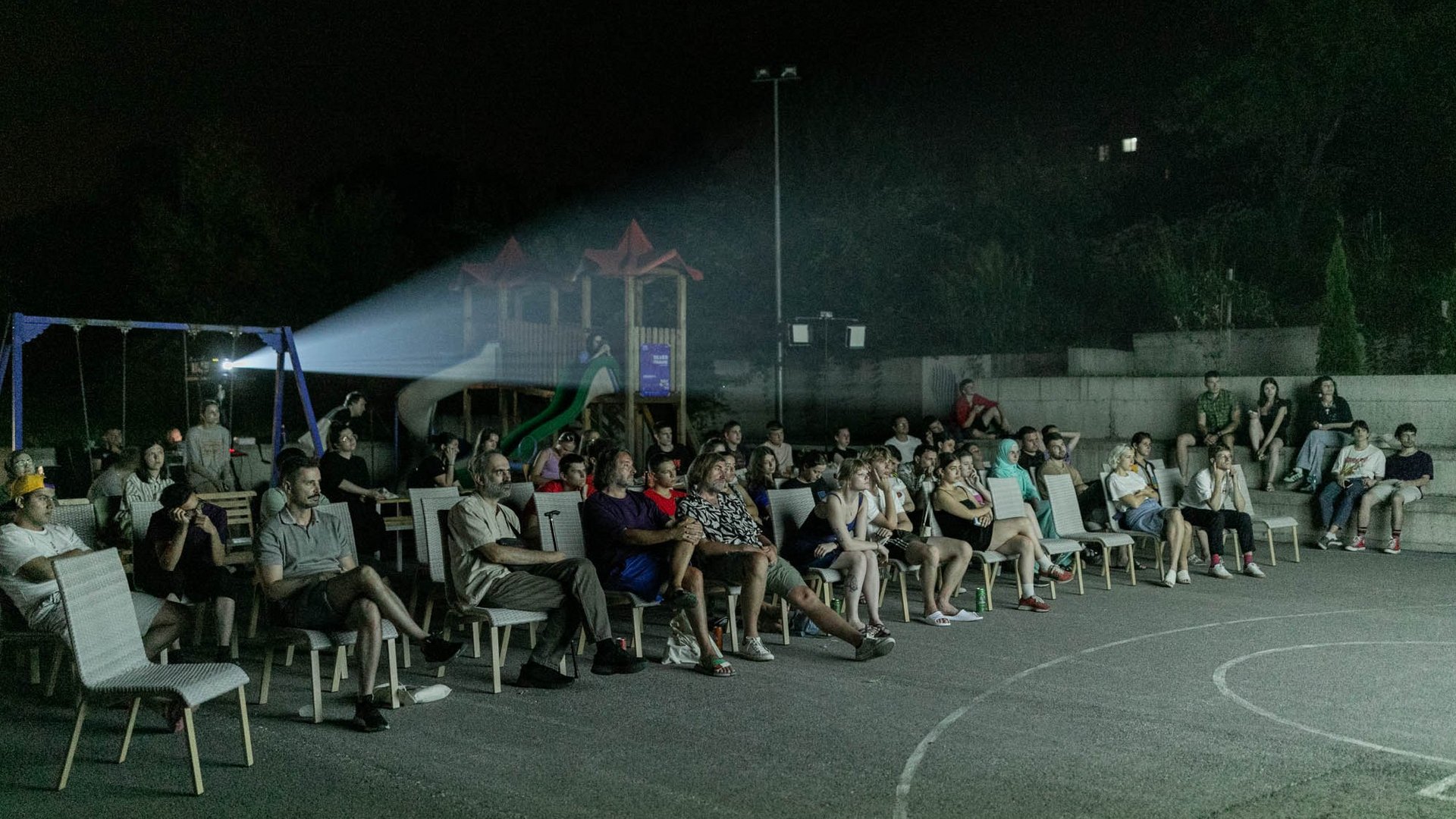
© Federica Giacomazzi

© Federica Giacomazzi
Srebrenica: A place of encounter. At the Silver Frame Film Festival, we brought together young filmmakers from all over Europe. Together, we told stories, connected across borders, and used the power of film for social change. Film as a bridge. In Srebrenica, we experienced the power of film to build bridges between cultures and generations. The Silver Frame Film Festival was a place of inspiration and exchange.
In mid-July, the Silver Frame Film Festival invited our artistic director Anna Ramskogler-Witt to Srebrenica (Bosnia) for its first edition. She had the pleasure of showing the film ‘Painting Dhaka’ to a very young and international audience in the village in the mountains of Bosnia-Herzegovina.
Why do festival trips always have to start so early? My train leaves Charlottenburg S-Bahn station at 4.30 a.m. and takes me to BER. I fly to Belgrade via Vienna to get to the first edition of the Silver Frame Festival in Srebrenica. I use both flights to read. I’ve watched around 300 films in the last few weeks and months, so it’s good to have a change. ‘Radical Tenderness’ by Şeyda Kurt immediately captivates me. Her thoughts on interpersonal interactions, and different perspectives on life and worlds of experience are touching. She writes, ‘Responsibility applies to my own actions in my relationship, but also to my reactions to circumstances that I did not intentionally initiate. How I react is my responsibility ... .’ Her book makes me realize once more how privileged I am to have grown up in a safe and loving environment, to have been able to live my life freely, and to now have the privilege of building a new festival.
Mario Husten, an friend to the Dokumentale, picks me up from the airport in Belgrade. He seems to have found a second home here. The former journalist and inventor of cultural spaces is currently supporting Dorcol Square, a cultural centre in Belgrade that provides a platform for art, music, and film.
Before we set off for the mountains, we meet up for lunch with friends from BelDocs, journlliast Milan Vokelić and Katarina Stankovic. We will be showing Katarina’s film ‘The Tempest of Neptun’ in Berlin this autumn. We discuss the rapid changes taking place in the media landscape and the rise of right-wing movements worldwide. After this intensive discussion, we pick up Serbian film-maker Olja. She accompanies us to Srebrenica. Together with three other professionals, Olja and I will be mentoring the participants of the Climate Mobile Residency.
In Srebrenica, oppressive heat awaits us. It won’t go away, not even after a heavy evening thunderstorm. We drive through Potočari and pass the memorial and cemetery commemorating the genocide that will forever remain associated with the name Srebrenica. We then arrive at the boot camp, where young people from all over Europe carry out charitable projects every year. This camp will be the centre of the Silver Frame Festival.
Ado Hasanović, the festival's Artistic Director, has managed to bring together young film-makers from all over the Balkans. The exchange between them, the international volunteers, and local young people illustrates what we are always emphasizing: film and art have the power to connect.
After a hearty dinner and some long conversations, I finally fall into bed exhausted. The following day, I work on the terrace of the Silver City Hotel while kittens frolic around me.
The Mobile Residency Lab starts at 10 a.m. It’s run by Amir and Dragan, and is designed to give our mentees a crash course in film techniques and journalistic standards. In the afternoon, I work with my mentee Dino on his project idea. He tells me about his commitment to fighting femicide. Dino stages plays and provides training courses to police officers to raise their awareness of the issue. I am impressed by his vision and engagement.
The festival opening ceremony is taking place this evening. Ado Hasanović has succeeded in attracting curators from Sundance, Cannes, Sarajevo, and other renowned festivals, who will each present a short film from their programme. The films are an impressive mix of emotional and socially critical contributions, and captivate with their unique aesthetics.
The second part of the programme consists of short films by students from six different universities in the Balkans. I am impressed by the quality and inventiveness of the works.
After the opening, we discuss the films around a campfire. We make plans for all kinds of future projects and emphasize what we have in common while singing ‘Bella Ciao’.
My last day in Srebrenica has come far too quickly. Our mentees are filming their stories, and we are there to support them. Dino takes us to a neighbouring retirement home that provides a haven for the mothers of Srebrenica. He talks to them lovingly about how the natural environment has been transforming around them and the changes they can see. Dino’s aim with his short film is to build a bridge between then and now, between young and old.
I am deeply touched by the filmed footage of all the projects and immediately them to present their projects at Dokumentale this autumn.
In the evening, we present the film "Painting Dhaka" by Lukas Zeilinger. The audience is both enthusiastic and agitated. Unfortunately, I have to leave before it ends in order to catch my flight from Sarajevo to Berlin early the next morning.
A German journalist takes me to Sarajevo. Once again, I experience overwhelming openness and get to know the country a little better thanks to her stories.
The Silver Frame Festival was an inspiring experience. Now I'm already looking forward to next year's edition and the collaboration at the Dokumentale in Berlin in the fall. I can only encourage everyone to mark the Silver Frame Festival firmly in their festival calendar and take the opportunity next year to explore fantastic short films and get to know exciting filmmakers from the Balkans.